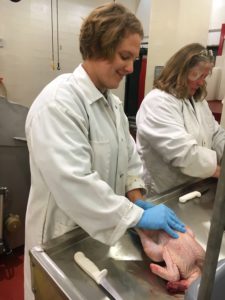Meat Processing Workshops a Cut Above
April 3, 2017/
Cooperative Ext., SUNY announce spring class schedule
by R.J. Anderson
When Samantha Schriber-Vanstrom decided to drive nearly five hours from her western New York home to attend the Harvest New York poultry cutting workshop at SUNY Cobleskill, she did so looking to maximize her small farm’s profits.
“I wanted to learn about how other people operate and ways to process my birds for better cuts,” said Schriber-Vanstrom. “I’d been quartering some birds for a couple years, but was curious about other ways to attract more customers through other types of cuts. I found that, and more, at the workshop. It was well worth the drive.”

Farmer Samantha Schriber-Vanstrom processes a chicken at the Harvest New York poultry cutting workshop held October 12 at SUNY Cobleskill.
Schriber-Vanstrom was one of 12 attendees at the October 12 session, part of a series of meat processing and marketing classes co-organized by SUNY Cobleskill and Cornell Cooperative Extension’s (CCE) Harvest New York economic development and sustainability program. Held at the SUNY Cobleskill Meat Laboratory, the one-day workshop was led by Meat Lab Manager Betsy Jensen, Harvest New York Livestock Processing & Marketing Specialist MacKenzie Waro, and Culinary Arts Instructor Mike Lapi, who led a hands-on butchering session.
Participants spent time learning the regulations for poultry slaughter, processing, and marketing, then visited the meat lab where they observed Lapi butchering a bird, after which they processed one themselves.
“This was the third class in the series, and it was a big success,” said Waro. “We have been very excited about the success of these workshops. Participants ask great questions, and walk away with new knowledge about meat cuts, marketing and processing.”
Based on the positive feedback following last year’s meat cutting workshops, Waro said Harvest New York and SUNY Cobleskill are beefing up their 2017 schedule. “Participants have been asking for additional workshops on cooking meat, and we will be adding that into our 2.0 meat workshops for the spring,” she said. “Workshop participants gain skills that they can bring back to their business and apply towards the future of their farms.”
At Schriber-Vanstrom’s farm in Kennedy, New York, which she operates with her husband, Eric, and his father, they milk 85 dairy cows while raising goats, sheep, pigs and Red Cornish chickens. The grass-fed meat is sold directly from the farm and at area farmers’ markets.
For Schriber-Vanstrom, the highlight of the poultry session came during the processing component of the workshop. “Mike was really good at showing us different things, answering questions, and making sure the information was useful,” she said. “Seeing how other people cut their birds and then actually doing my own processing was a great learning experience. Hands-on is the way I learn best, so it was really beneficial to me.
“And having Betsy and Mackenzie there to cover the marketing and regulations aspect in the same day was also really helpful,” she added. “They were good about getting into the nitty gritty of some of the things we as farmers don’t necessarily think about.”
Upcoming schedule of classes for meat producers:
February 3- Lamb 1.0 (marketing and processing) hosted at SUNY Cobleskill
March 14-15 Cured Meats hosted at Cornell University
March 17- Beef 2.0 (processing and cooking) hosted at SUNY Cobleskill
April 21- Lamb 2.0 (processing and cooking) hosted at SUNY Cobleskill
May 17 – Pork 2.0 (processing and cooking) hosted at SUNY Cobleskill
May 31-June 1 Cured Meats hosted at Cornell University
R.J. Anderson is a staff writer/communications specialist for Cornell Cooperative Extension.
To register or for more information, call Linda Serdy, SUNY Cobleskill Office of Professional and Continuing Education at 518.255.5528 or SerdyML@cobleskill.edu.
Posted in News and Updates, Small Farms Quarterly

